Contact center of the Ukrainian Judiciary 044 207-35-46
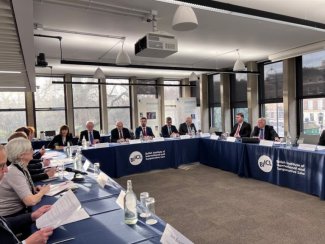
This week, the Supreme Court delegation headed by President Vsevolod Kniaziev paid an official visit to London at the invitation of the UK government and the British Institute of International and Comparative Law, which implements joint justice projects in Ukraine.
During the roundtable discussion "Ukrainian Courts and Judiciary in the Context of a Full-Scale War", the Supreme Court judges informed the participants about the situation in Ukraine after the start of the full-scale invasion of Russian troops.
The SC President thanked his British colleagues for their continued support of Ukraine during this war, for the UK's leadership in all areas of support for Ukraine, including the judiciary, and for helping our citizens who were forced to move to the United Kingdom.
Vsevolod Kniaziev told his colleagues about the current situation in Ukraine, including in the field of justice, and emphasized that the Russian army was committing horrific atrocities against civilians: killing, raping adults and children, forcibly displacing civilians and abusing POWs. "After the Russian army was pushed out of Kyiv, Kharkiv, and Kherson regions, we are discovering more mass graves, conducting exhumations, and documenting inhumane treatment and torture. I personally visited the sites of these tragic events," he said.
The SC President emphasized that compliance by all parties with the provisions of the Convention respecting the Laws and Customs of War on Land and the Geneva Convention relative to the Protection of Civilian Persons in Time of War was mandatory under all circumstances. "However, the Russian Federation continues to commit genocide against the Ukrainian people, violating all these laws," stressed Vsevolod Kniaziev.
During his speech, the SC President focused on the work of the courts starting from February 24, 2022. He pointed out that during this period, Ukrainian courts dealt with about 2 million cases, including about 70 thousand cases heard by the Supreme Court.
However, it is not always possible to ensure the continuous operation of the court during the war. In wartime, judges face serious difficulties. In addition, a lot of courts in the occupied territories or in the combat zone can't administer justice at all. Judges in courts that temporarily do not administer justice are transferred to other courts of the same level and specialization. "At present, we have 116 courts with a change in their territorial jurisdiction (including the temporarily occupied territories of Luhansk and Donetsk regions and the Autonomous Republic of Crimea)," the SC President said.
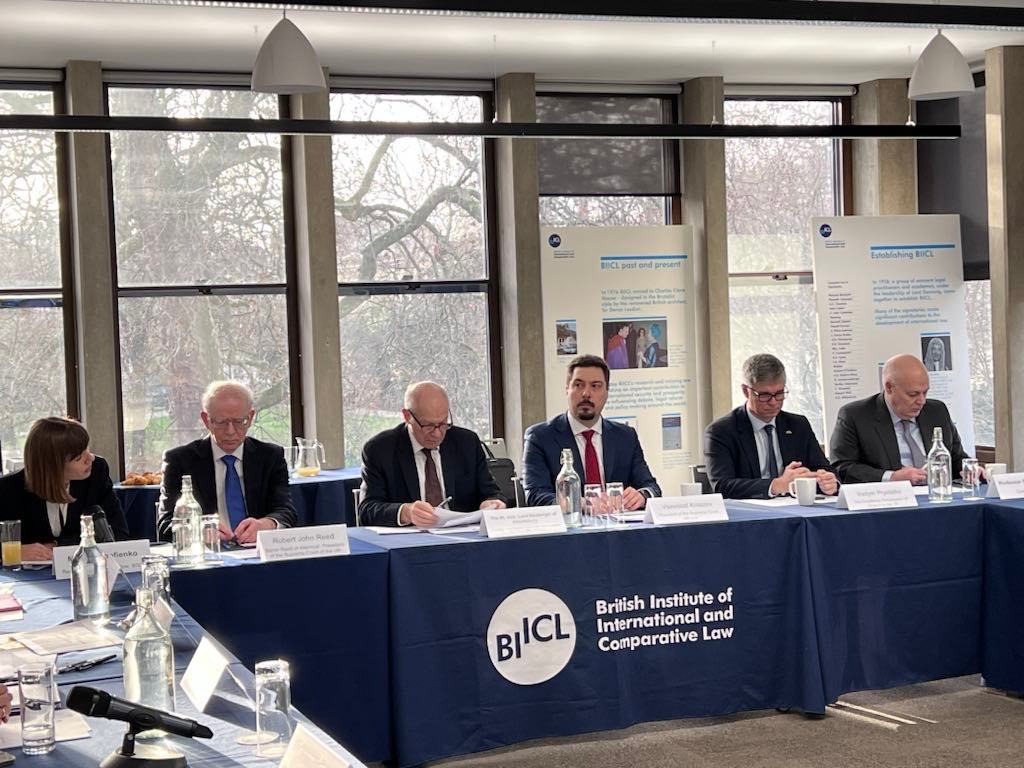
He also highlighted the horrific cases of murders, kidnappings, and imprisonment of judges for their refusal to cooperate with the occupation authorities.
"The courts are functioning, they have not ceased their work. At the same time, judges and court staff, especially in regions close to the active combat zone, are exposed to danger on a daily basis. We are making efforts to maximize the safety of all participants in the judicial process, so another goal of our visit to London is to learn from your experience of online justice, something we are actively working on in Ukraine," summarized the SC President.
Vsevolod Kniaziev also informed about Ukraine's progress on its way to accession to the European Union. Thus, in January 2023, the Congress of Judges elected eight members of the High Council of Justice, so the HCJ is now authorized and has resumed most of its functions. Regarding the resumption of the work of the High Qualification Commission of Judges of Ukraine, the SC President stated that interviews with candidates were underway, so this judicial governance body is expected to start working in the coming months.
Supreme Court Judge Ivan Mishchenko, who chairs the Competition Commission for the Selection of Candidates to the High Qualification Commission of Judges of Ukraine, and Deputy Chairman of the Ethics Council Anthony Hooper briefed the roundtable participants on the work of the Competition Commission and the Ethics Council.
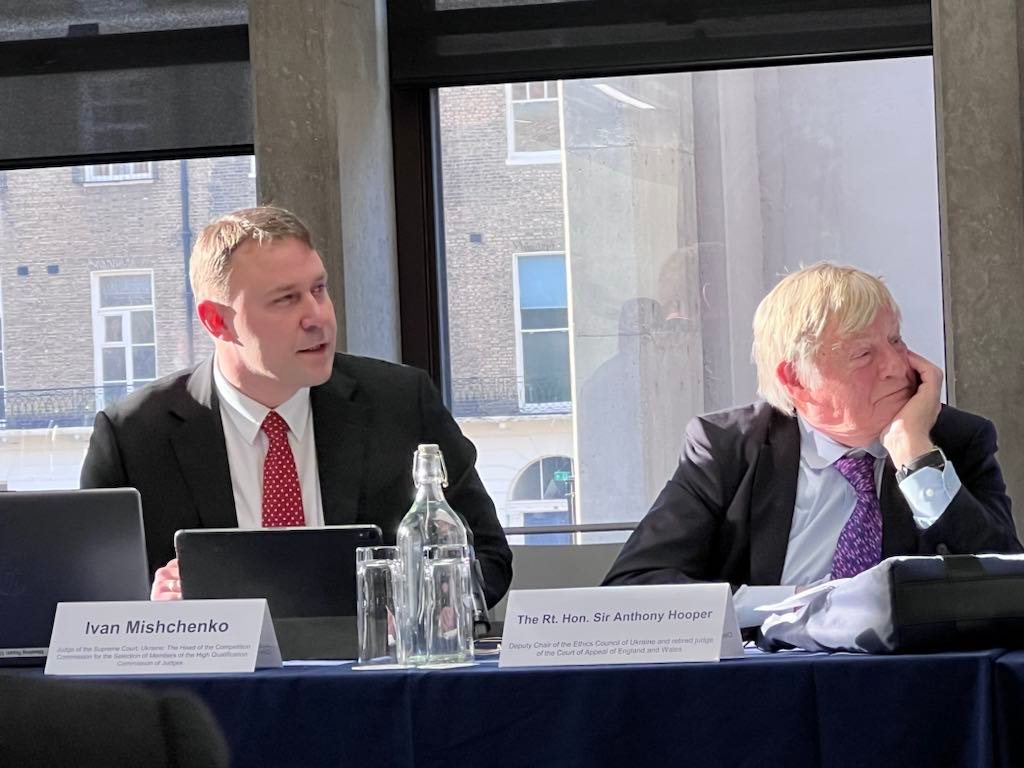
Anthony Hooper elaborated on the approaches to the HCJ members' selection, criteria of integrity and ethics, as well as examples of candidates' misconduct that were studied by the members of the Ethics Council in 2022.
Ivan Mishchenko noted that "the Competition Commission applies the same criteria and approaches to assessing the integrity and ethics of candidates as the Ethics Council, but the Commission follows the positive selection model, so it does not provide negative conclusions: if a candidate does not meet the criteria, he or she simply does not pass to the next stage of the competition and has no chance to be shortlisted." According to the Supreme Court judge, the Competition Commission will complete interviews with the candidates in February and by the end of March will have compiled a shortlist of winners.
In her speech on bringing the Russian Federation to justice for crimes committed on the territory of Ukraine, Judge of the Grand Chamber of the Supreme Court Tetiana Antsupova stated that "Russia's aggressive war on the territory of Ukraine is a manifest deliberate and conscious violation of the principles and norms of international humanitarian law and human rights. And this definitely poses a challenge to the international legal order in terms of bringing the aggressor to justice for the crimes committed and preventing them."
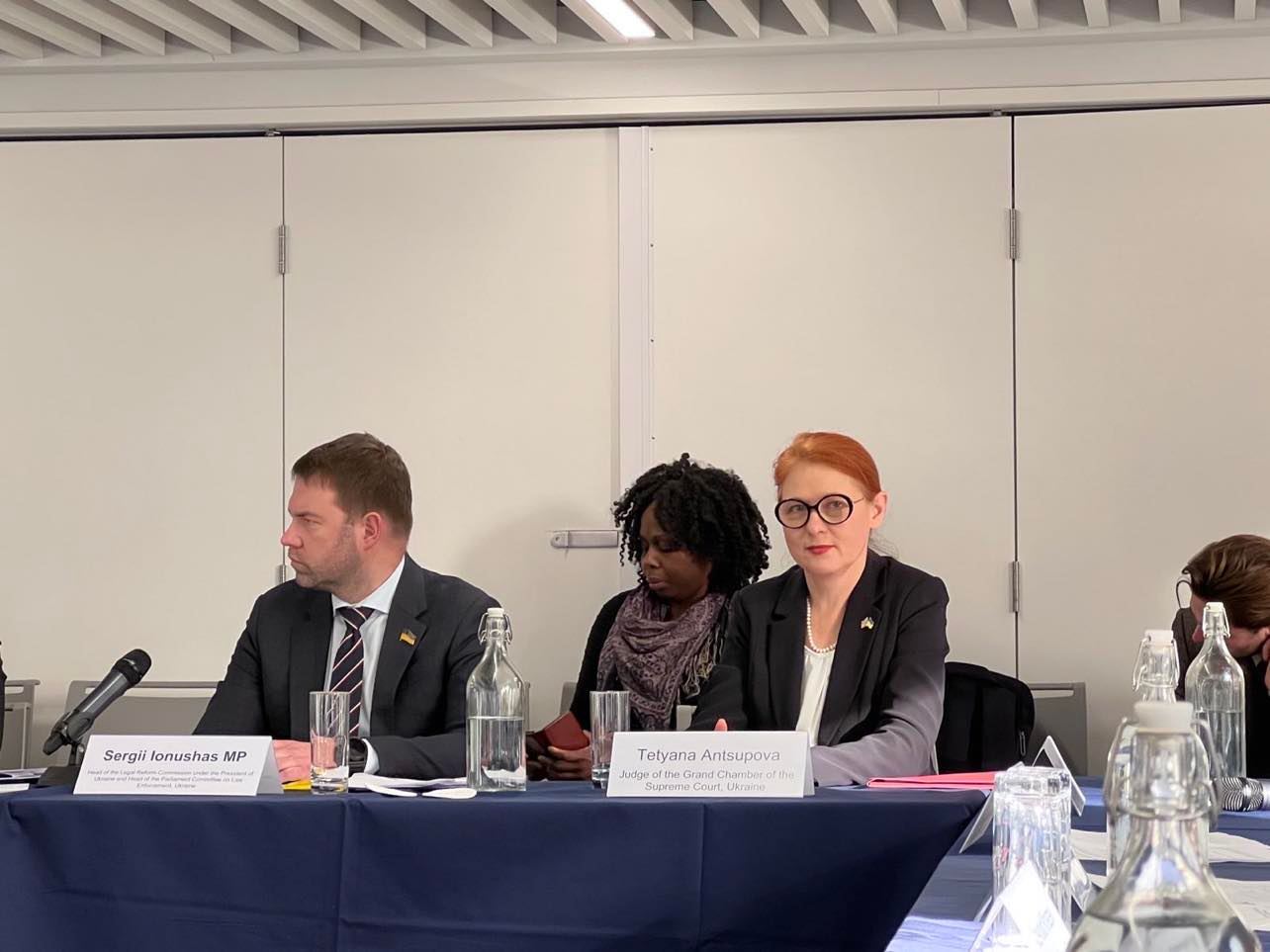
Last week, the ECtHR declared admissible the application in the case of Ukraine and the Netherlands v. Russia (concerning a number of alleged human rights violations by separatists in Donbas in 2014 and the downing of MH17). Therefore, we are expecting a judgment on the merits of the case in due course.
"If we talk about the jurisdiction of the International Criminal Court," the judge of the Grand Chamber of the Supreme Court noted, "the biggest gap in accountability is still the crime of aggression. Unlike war crimes, crimes against humanity, and genocide, the ICC can only prosecute the crime of aggression against parties to the Rome Statute who ratified its aggression provisions. This is not the case with Russia. Therefore, the issue of bringing high-ranking state officials of the Russian Federation to justice remains relevant. To fill these gaps and ensure that Russia's leadership is held accountable for the crime of aggression, Ukraine has initiated the creation of a special international tribunal for the crime of aggression. At this stage, the idea has been supported by numerous institutions and organizations."
According to Tetiana Antsupova, one of the biggest challenges for Ukrainian justice is the increase in the number of cases involving claims for compensation from victims whose property was destroyed as a result of Russia's war against Ukraine.
The Supreme Court has issued several decisions on the judicial immunity of the Russian Federation in cases of compensation for damages caused by the aggressor state, concluding that Ukrainian courts may disregard the judicial immunity of the Russian Federation and consider cases of compensation for damages in lawsuits filed against the aggressor state.
On November 14, 2022, the UN General Assembly adopted a resolution according to which the Russian Federation could be held accountable for the war in Ukraine. The resolution recommends that a register of losses be created and recognizes the need for compensation. In particular, this procedure provides for the award of reparations in favor of Ukraine, which the Russian Federation must reimburse.
In her speech on the digital transformation of courts during the war, Supreme Court Judge Olena Kibenko pointed out that since the beginning of the full-scale invasion, 95 court premises, which accounts for 12% of the total number of courts, had been destroyed (12 premises) or significantly damaged (83 premises). Thousands of pending cases and court archives were destroyed or lost. Now many people are trying to resume their cases. There is a special procedure for this. But it takes a lot of time. Moreover, sometimes it is impossible due to the loss of evidence.
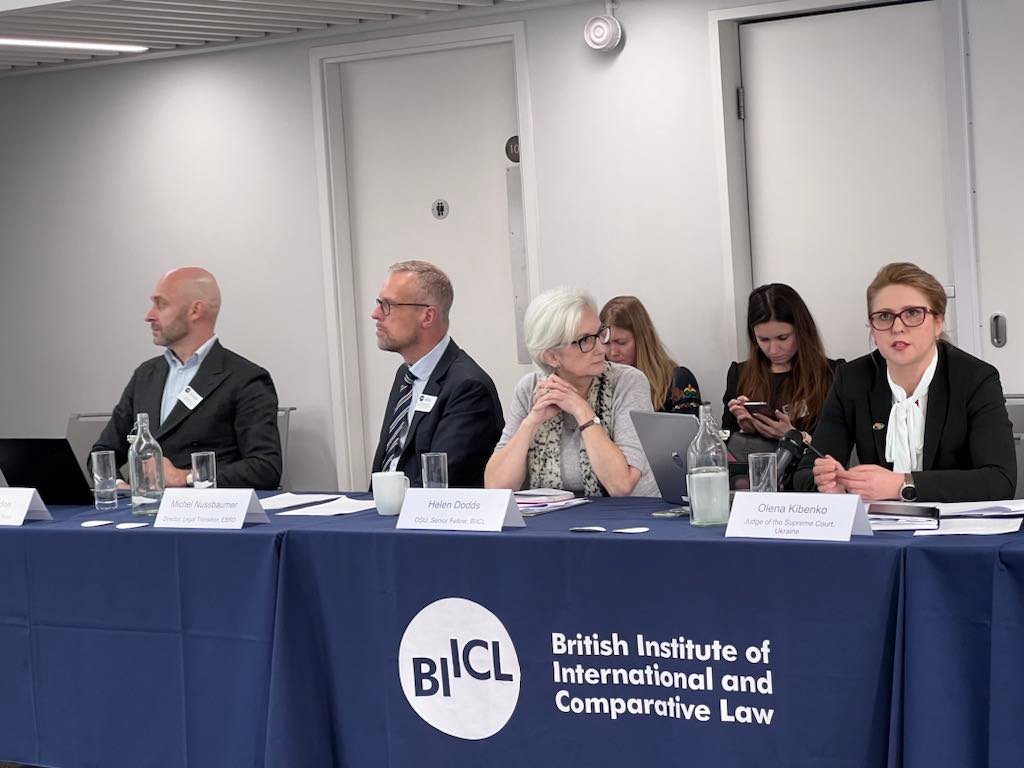
In addition, numerous missile attacks and blackouts, the inability to quickly get to the courthouse, and the need to suspend proceedings during air raids for security reasons bring to the fore the issue of introducing online case processing to ensure proper access to justice for citizens and the safety of all participants in the judicial process.
In January 2023, Parliament received a draft law aimed at achieving three main goals:
The adoption of such a draft law will allow to address all the problems listed above and ensure proper consideration of court cases in the shortest possible time.
According to Olena Kibenko, such an approach should be applied beyond wartime, as many countries are witnessing the era of digital transformation of justice. Justice is shifting from "delivered in a certain place at a certain time" to "24/7 online access from any part of the world." It is not through open hearings that the open justice is ensured, but through the publication of information on the Internet.
She pointed out: "If we want to make online courts accessible to people and small businesses, we need to take a different approach, as in Canada, China, and Singapore, which is "a smartphone court" that functions completely online and does not require the help of professional lawyers. I am deeply convinced that if we want to have a successful online court, we do not only need to implement innovative IT solutions, but also to review and significantly simplify our procedural rules."
The Supreme Court judge said that the Supreme Court and other judicial bodies were currently working on an EBRD pilot project. Its goal is to create online tools for resolving minor disputes in commercial courts. If successful, the project will be extended to courts of other jurisdictions in Ukraine and courts of other countries.
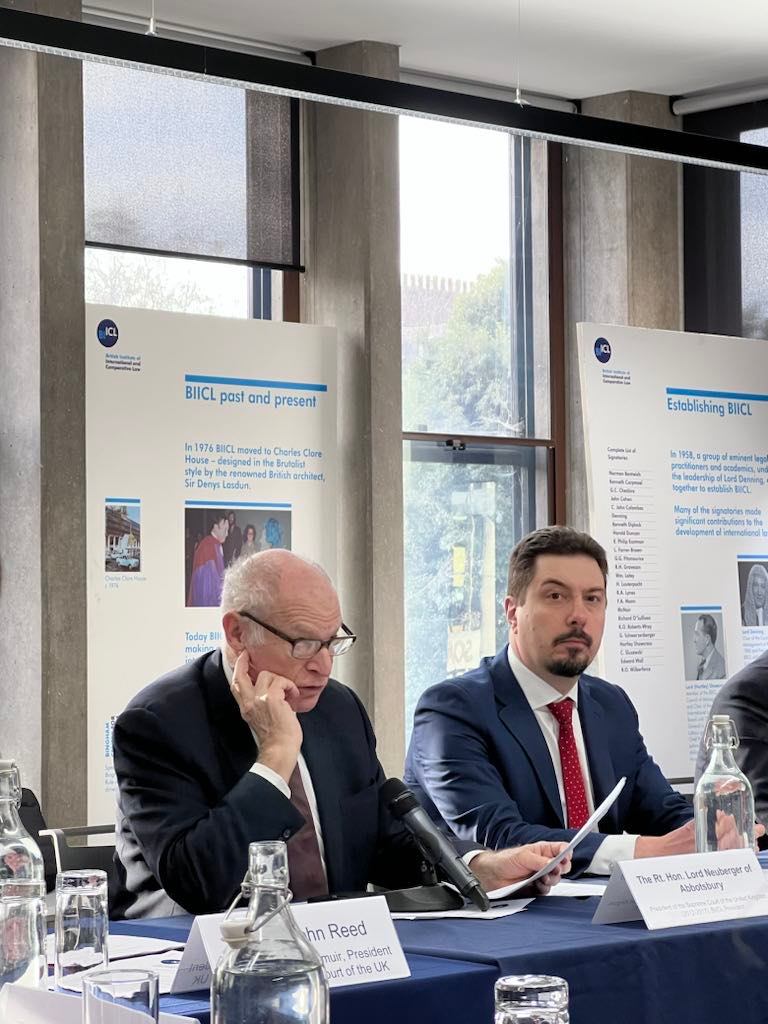
Lord David Neuberger, President of the Supreme Court of the United Kingdom (2012-2017), President of the British Institute of International and Comparative Law, stated that "Russia's aggressive war against Ukraine has revealed Ukraine's true friends, and it is clear that the UK is one of Ukraine's most reliable partners in this terrible time."
He has also noted that the UK's legal support for Ukraine has been and remains multifaceted, including assistance in the investigation and prosecution of war crimes. There are many governmental and private initiatives to provide legal aid, including a legal working group on accountability for crimes committed in Ukraine and the creation of a special tribunal to investigate crimes of aggression. British judges also participate in training programs for Ukrainian judges on war crimes trials.
"Ukraine has demonstrated a steadfast commitment to its European integration aspirations. War should not be a pretext for abandoning the basic values of democracy, the rule of law and human rights, or narrowing their content. No matter how difficult but democratic stability in Ukraine must be ensured and strengthened," emphasized David Neuberger. "I believe that judicial diplomacy is one of the important components of court independence. And this visit can have a great impact on maintaining judicial dialogue between our partner states in this difficult time of war," he concluded.
Lord Robert John Reed, President of the Supreme Court of the United Kingdom, expressed his support for the judges of Ukraine in this challenging time. He focused on further transformation of Ukraine's judicial system and its compliance with European principles. He emphasized the need to develop legal culture as one of the elements of an independent court, as well as to work with the younger generation of Ukrainians.
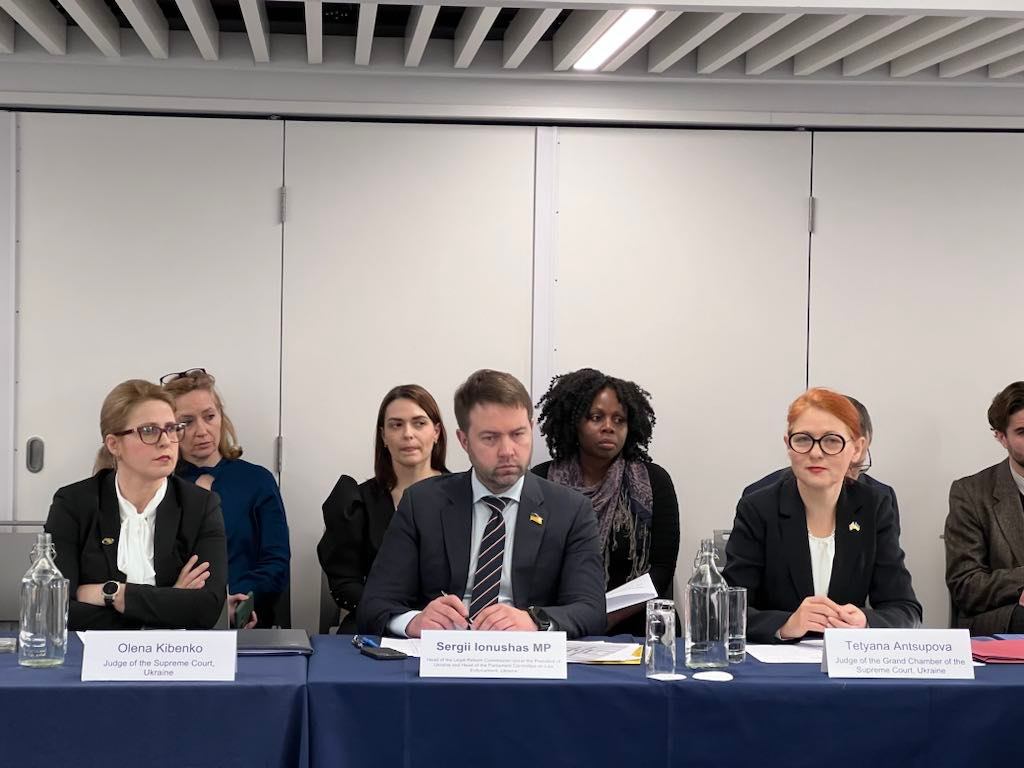
Ukrainian MP Serhiy Ionushas also took part in the event, and from the perspective of a legislator, he outlined the challenges facing the courts and parliament in connection with Russian aggression and reforming the justice sector on the way to EU accession.
The event was moderated by Maria Tymofiienko, project coordinator and manager, research associate at the British Institute of International and Comparative Law.
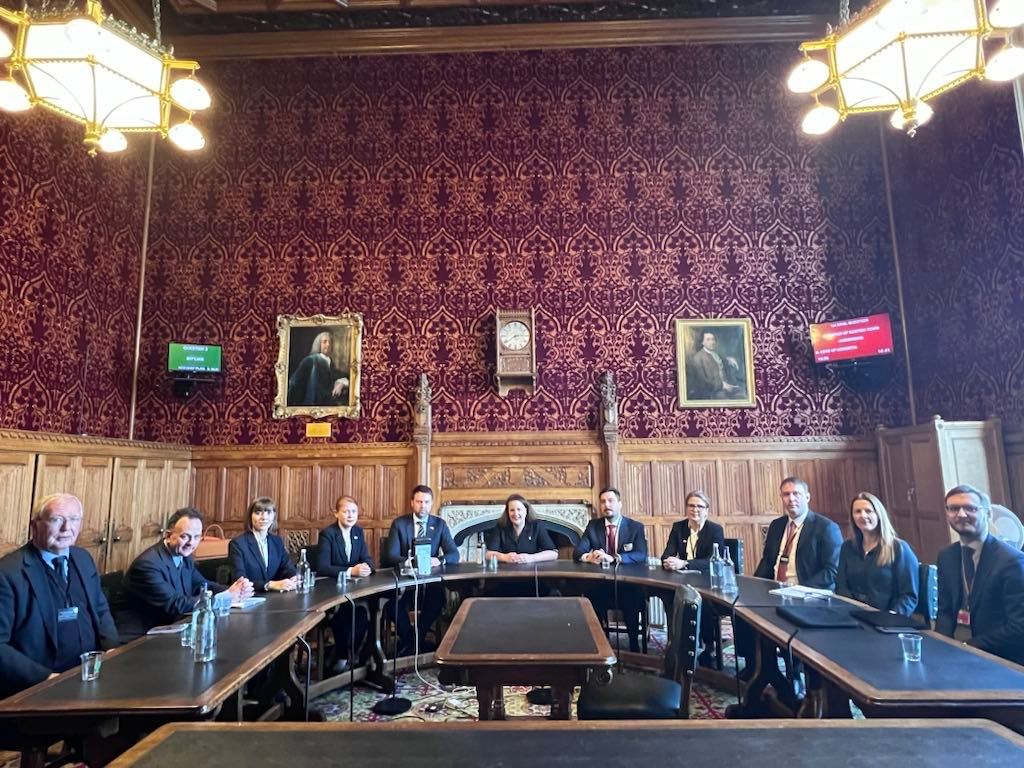 |
|
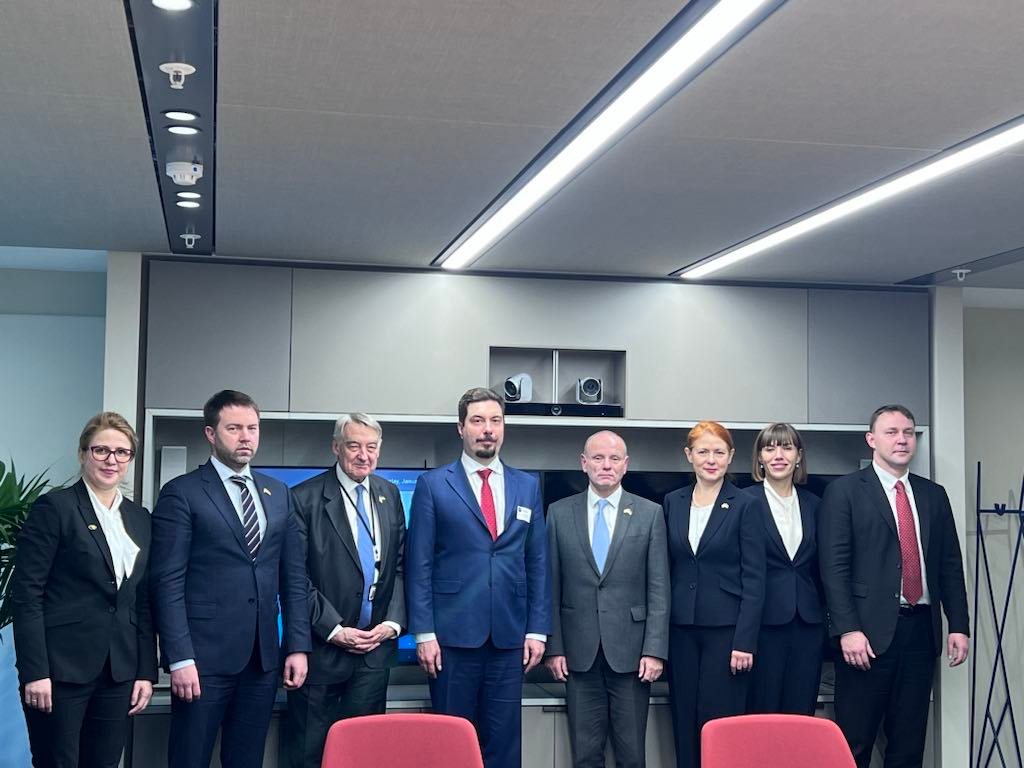 |
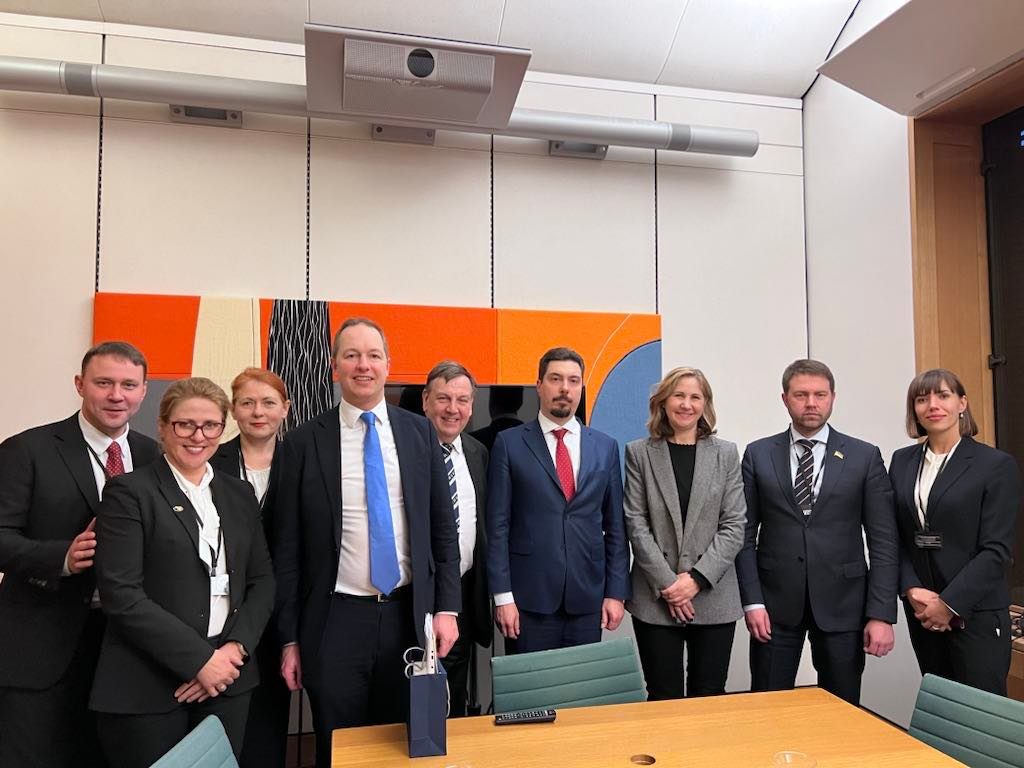 |
In the framework of the official visit, the Supreme Court delegation also met with the Attorney General for England and Wales, Victoria Prentis, Under Secretary of State for the Ministry of Justice Mike Freer, Under Secretary of State for Justice Lord Bellamy, John Whittingdale MP and members of Parliament.
During these meetings, they discussed cooperation in the investigation of war crimes, the creation of a special tribunal on Russian aggression, the possibility of confiscating Russian assets to pay reparations, reforms in the justice sector, etc.
The Supreme Court delegation is also scheduled to meet with the Supreme Court of the United Kingdom, the Royal Courts of Justice, and representatives of the EBRD.